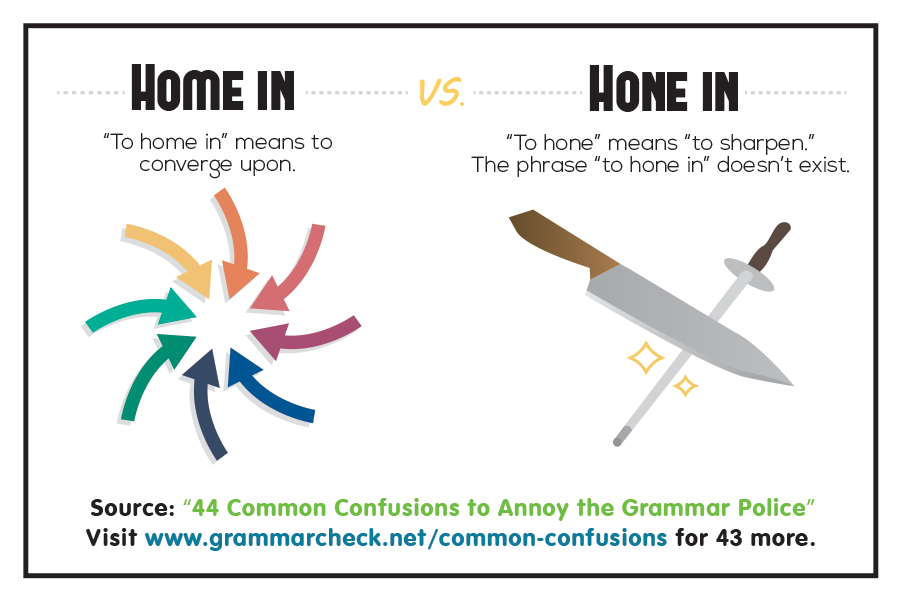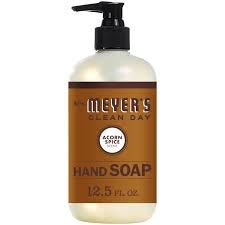I currently have a job that includes, among many things not listed in the initial work description, copy-proofing web pages.
(*If you find this ironic considering the grammar choices and typos featured in your weekly ANNIEGRAM, you are in the good company of my closest friends.)
Anyway. Recently there was an error I flagged on the company’s webpage— a mistake of the “hone in/home in” variety.
A very simple explanation of the distinction is here, and here are the definitions of both words:
HONE (verb): To sharpen, like a knife. To refine over time, like a skill or talent.
HOME (verb): To move or be aimed toward (like a target or destination) with great accuracy.
Think of it like this: You hone a blade or skill. A homing pigeon or homing beacon zeroes in on something. You can say “I’m honing my ability to digest dairy by homing in on pizza parlors in my area,” or, “If can home in on the right fake British accent I can hone my character acting skills,” or, “I know! In order to find a mate, I’ll hone my witty banter and home in on single dudes at the bar!”
Etc…
If you were previously unsure which one of these uses is correct, fear not! You are in the public majority. And this is the truth I learned when I flagged the “hone in on” error and went down a Word Wonderland rabbit hole where I realized that nothing means anything and everything can be something.
Because here’s the thing: As much as the above info-graphic wants to assert that the phrase “hone in on” doesn’t exist, that’s not really true.
According to this really fascinating deep-dive into the home/hone debate, about 81% of Americans (USA! USA! We’re #1!) believe—indefatigably—that “hone in on” is the right phrase.
In fact, SO many people are convinced that “hone in on” is the correct term that it is becoming common usage, and, thus, on its way to being an “acceptable” form of grammar.
Like “literally” transforming from a qualifier of literal truth to an emphatic adverb, “hone in on” is being used SO consistently by a majority of people SO stubbornly set on the rightness of their perspective that they are CHANGING THE REALITY OF THE THING ITSELF.
The power of the public!
The fluidity of language!
The wonder of worrrrrrrds!
Not only that, but because there’s so much confusion about the hone/home distinction, the technically correct usage of “home in on” is often flagged by humans as wrong (as it was when I submitted it to the web correction team).
Can something “wrong” be turned “right” and something “right” be turned “not-right" by public opinion? It would seem so!
Unfortunately, the article I shared above explains that the confusion over the two words has essentially “skunked” both of these phrases in a “damned if you do, damned if you don’t” sort of way. Use the more popular “hone in on” and grammar snobs will flag you. Use the correct “home in on” and your public consumer is likely to think you’re wrong.
Soooooooo both of these phrases are essentially dead and language is fickle and there is no right answer and nothing means anything and that’s the end, OK BYE!
Awwww, you know I wouldn’t leave you like that! The truth is, it’s a little scary, and yet kind of liberating, to realize that our rules—and realities— are so fluid.
Like oyster phlegm changing into pearls or rocks turning into diamonds or whatever, the magical combination of time and intention can make a nothing into a shiny new something.
I know this is a truth I’m trying to remember, as the pandemic wears on and I’m sitting at this desk from morning till night and I don’t talk to other humans for days on end and I’ve been single for over a decade and I’m getting bored of all the food I eat as my main form of life-entertainment and everything just seems very, very stuck and very, very same.
Sometimes, it’s just nice to remember that same-ness never lasts—that surprising changes can happen, and that life isn’t so static as we think.
Honing or homing, here’s hoping for shiny new un-static somethings.
Love,
Annie B.
THREE GOOD THINGS
I don’t have Tik-Tok (or “The Tik-Tok” as my generation calls it) because I will never get any work done if I do, buuuuuuut sometimes people send me priceless gems from there, and this page where a pug-owner gives daily advice to viewers based solely on whether or not his 13-year-old dog “has bones” or “doesn’t have bones” is 100% very pure.
I’m really, REALLY loving my new Mrs. Meyers seasonal Acorn Spice handsoap and cleaner, y’all. The seasonal apple variety smells like a jolly rancher threw up on a Bath & Body Works spray so don’t get that one, I WARN YOU. But this Acorn Spice one is a delightfully festive mix of vanilla and spices and is my new fall fave. (Is it sad that I base my current life contentment around seasonal gimmicks? SHHH DON’T ANSWER THAT.)
Speaking of seasonal gimmicks, this man embodied *Spoopy vibes galore by selling his house on Zillow dressed in a skeleton costume. Well-played, man with dilapidated house, WELL-PLAYED.
* Yet another common phrase born out of a mistake!
Want to help assure me that these missives aren’t simply disappearing into the internet ether? Click on the button below and say hi!











WHEN LANGUAGE COPS GO BAD
From grammarcheck.com, exemplifying the difference between advanced and advance:
Ludwig attended the concert with his most advanced piano students – those whom he
thought would most appreciate the music.
The thing is that it's supposed to be "those WHO he thought would...." if we're going to be strict, honest-to-god, old-fashioned grandma language cops. Now I'm disillusioned with the expertise of these particular language guardians. Who knows what or whom to believe any more? They need to hone their who-whom usage skills so they can home in on the correct forms.
Really? 81% ? Really!!!?? It shakes your confidence in our democracy itself, doesn't it? Haven't they ever heard of a homing pigeon? Did they think it was called a honing pigeon? What the whatever?